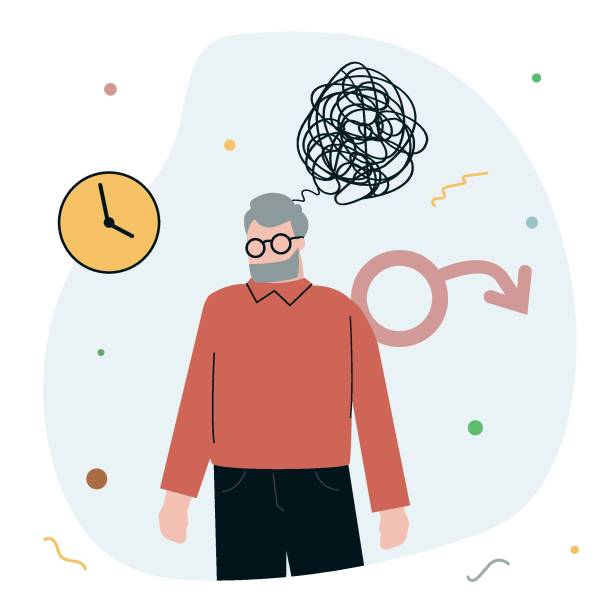
Hormonal changes in men are a natural part of the aging process. However, it can often lead to various health concerns that impact overall well-being. These changes can begin earlier than many expect, and understanding their causes is essential for managing the symptoms effectively. In this blog, we’ll explore hormonal changes in men, the common causes behind them, and how they can be treated.
Understanding hormonal changes in men. Well, it can also refer to fluctuations in the levels of hormones that regulate various bodily functions. While women’s hormonal changes, such as those during pregnancy, menstruation, or menopause, are more commonly discussed, men also experience significant hormonal shifts throughout their lives. These shifts are usually tied to the natural aging process but can also result from various health conditions.
One of the most well-known hormones in men is testosterone. Testosterone plays a crucial role in regulating several bodily functions, including sexual drive, muscle mass, bone density, and hair growth. As men age, especially after 25 or 30, their testosterone levels gradually decline, leading to a variety of physical and emotional symptoms. Other hormonal changes after 25 in men can be estrogen, cortisol, and thyroid hormones that change over time, which can significantly impact men’s health and quality of life.
What causes hormonal changes in men?
Hormonal changes after 25 in men often happen because of many factors. These factors can be either controllable or uncontrollable, and understanding them is key to addressing the issues that arise.
Controllable Causes of Hormonal Changes in Men
Lifestyle Factors: Poor diet, lack of exercise, smoking, and excessive alcohol can disrupt hormones. High sugar and processed foods increase insulin, cortisol, and estrogen, affecting testosterone.
Stress: Hair loss due to hormonal changes in men can also happen because the cortisol levels rise suppressing testosterone and causing fatigue, and irritability.
Obesity: Excess body fat, especially abdominal fat, increases estrogen and reduces testosterone, contributing to insulin resistance and hormonal imbalances.
Medications: Certain medications, like those for hypertension, depression, and diabetes, can lower testosterone or affect thyroid function causing problems related to hormonal changes in men.
Sleep Deprivation: Lack of sleep lowers testosterone production, with men sleeping less than seven hours having reduced levels.
Uncontrollable Causes of Hormonal Changes in Men
These are some of the causes that cannot be treated with mere lifestyle changes or making any other changes either this can be treated with specialised treatments or nothing.
Aging: Hormonal changes after 25 in men cause testosterone to decline naturally leading to hair loss, reduced libido, and fatigue.
Genetics: Some men are genetically predisposed to low testosterone or conditions like hypogonadism.
Chronic Illnesses: Conditions like diabetes, hypertension, and hypothyroidism can disrupt hormones, causing fatigue and weight gain.
Injuries or Illnesses to the Testicles: Testicular issues, like mumps or cancer, can reduce testosterone production and cause symptoms.
Environmental Factors: Exposure to endocrine-disrupting chemicals (EDCs) in plastics and personal care products can cause hormonal imbalances.
Treatment for hormonal changes in men
Fortunately, many of the symptoms associated with hormonal changes in men can be managed through medical treatments. Here are some common approaches to managing and treating hormonal imbalances:
Hormone Replacement Therapy (HRT)
One of the most effective treatments for hormonal changes in men, especially a decline in testosterone levels, is Hormone Replacement Therapy (HRT). Synthetic or bioidentical hormones are added to the body’s natural hormone levels as part of this therapy. In men, testosterone replacement therapy (TRT) can help restore normal testosterone levels, improving symptoms such as fatigue, low libido, depression, and hair fall due to hormonal changes. HRT can be delivered through injections, patches, gels, or pellets. The appropriate method will depend on individual preferences and medical needs. You can also get this therapy at the anti-aging centre after getting the hormonal imbalance test you will know which hormones are causing the problems and can go for HRT.
Lifestyle Changes
Hormonal changes in men can also happen because of lifestyle issues. Therefore, changing to a healthy lifestyle can aid in the natural regulation of hormones. This entails maintaining a healthy diet, exercising frequently, controlling stress, and getting enough sleep. Maintaining a healthy lifestyle can increase the efficacy of hormone therapy and, in certain situations, even lessen its necessity.
Medications
In some cases, doctors may prescribe medications to treat underlying conditions causing hormonal imbalances. For example, thyroid hormone replacements can address low thyroid function, while medications like clomiphene citrate can help men with low testosterone levels.
Supplements
Certain supplements, such as zinc, magnesium, and vitamin D, can help support hormone production and balance. These supplements may be recommended as part of a broader treatment plan to address hormonal changes in men. You can get a variety of supplements based on your condition at the TAC’s longevity program. That gives health supplements based on your tests, understanding the root cause and the areas that need improvements.
Conclusion
Hormonal changes in men are a natural part of life, but they can lead to symptoms affecting daily living. Whether due to aging, lifestyle, or health conditions, understanding these shifts and seeking treatment, like Hormone Replacement Therapy (HRT), is crucial. If you’re experiencing symptoms like hair loss after 25, consulting a healthcare professional is essential. TAC’s longevity program offers advanced testing and personalized treatments to address the root causes of hormonal imbalances, helping you improve your quality of life and live healthier.
